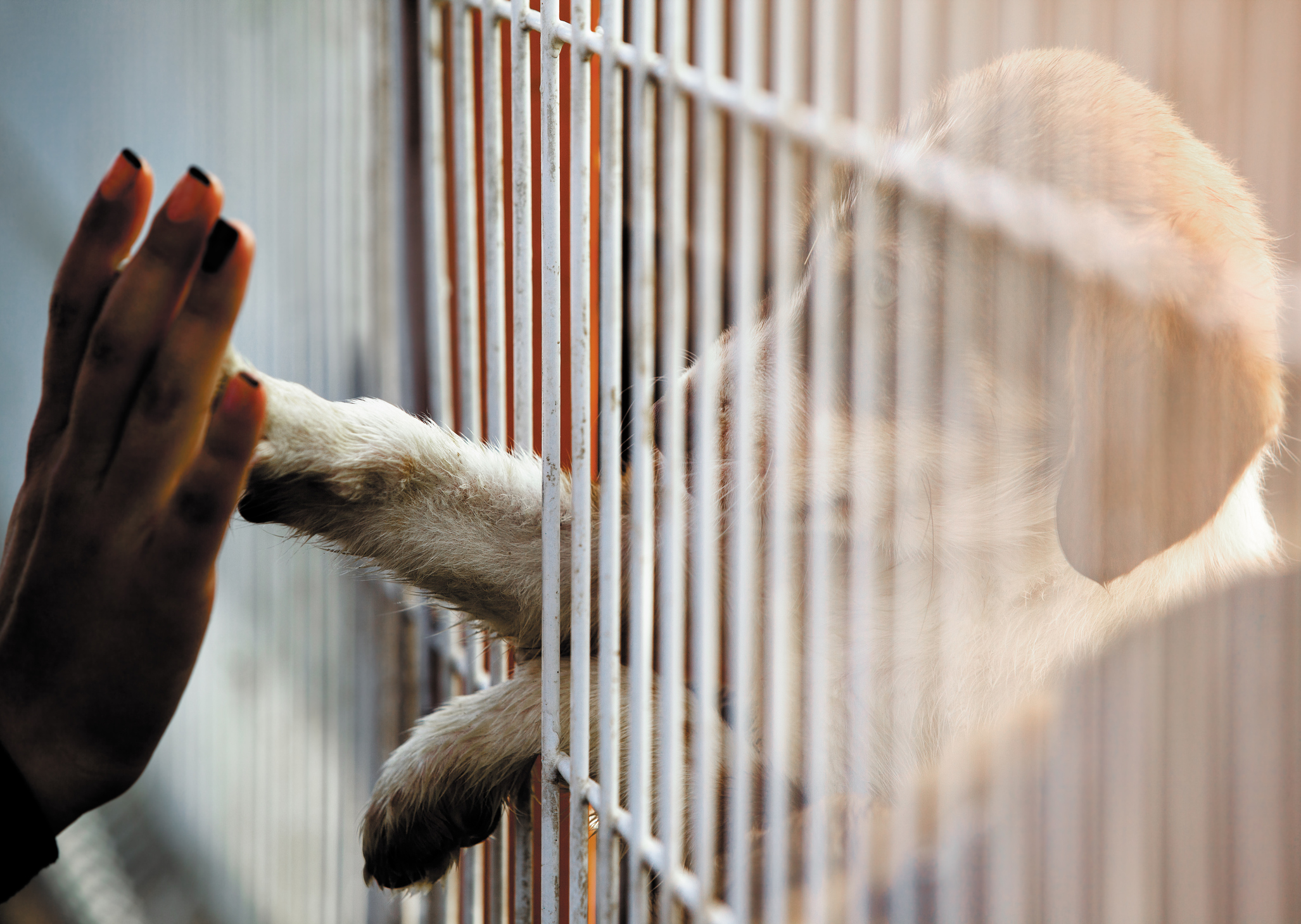10 of the top rescue dog myths busted!
30th January, 2020

Thinking of getting a dog? Great news! But before you head to your nearest breeder, have you considered welcoming a rescue animal into your home?
With 130,000 dogs coming into UK rehoming charities each year, there’s bound to be the paw-fect pooch for your family in a shelter near you. They’ll be neutered, vaccinated and vet checked – and desperate to find their forever home.
Sadly, however, many would-be owners won’t even consider rescue dogs due to misconceptions about what rehoming really entails.
Read on for our myth-busting guide to rescue dogs – and find out how pup insurance can help you keep your newfound friend happy and healthy.
Myth 1: Rescue dogs are damaged and difficult
Dogs need rehoming for many reasons. It could be that a family has a new baby or is moving abroad. It might be that an elderly person can sadly no longer care of their adored pet.
Such an animal will adapt easily to your new home and quickly become a loving pet for your family.
However, it’s also true that behavioural problems are amongst the most common reason for owners to hand their animals over to rehoming centres or charities.
In many cases, this is because owners underestimated the time and effort required to train a puppy properly, leading to hyperactivity, lack of housetraining, or even aggression. At shelters, such pooches can be taken in hand, then rehomed once they’ve been professionally trained.
Other dogs have been rescued from the streets or uncaring homes. Shelters do a lot of work rehabilitating traumatised dogs, helping them to overcome their fears and restoring their trust in humans before placing them in a loving home.
Could you be the family that gives a misunderstood or maltreated mutt a second chance in life?

Myth 2: Rescue dogs won’t be loyal to me
Dogs are generally loving and loyal animals. It stems from their origins as pack animals, when being part of a tight-knit group was essential for survival.
If you bring a rescue dog into your home, treat it well, and train it to obey your commands, it will regard your family as its pack and you as the leader.
Yes, initially your pet may wonder where its previous owners have gone. But in no time at all, it will be relaxing into your home, and treating you with doggy devotion.
Myth 3: I can’t get a rescue dog as I want a pure breed
All sorts of dogs wind up in shelters: cross breeds, pure breeds, and every type of mutt under the sun.
If you have a specific dog in mind, there may very well be an organisation dedicated to rehoming that breed. Greyhounds, for example, are frequently rehomed once their racing days are past, and make fantastic family pets.
You should also think carefully about whether a pure breed is really right for you. Some are prone to certain illnesses which might not become apparent till later in life, so it’s a good idea to take out insurance for dogs that covers your pet for illness as well as accidents.

Myth 4: I work full-time so won’t be approved to rehome a dog
As far as rehoming charities are concerned, working full-time doesn’t rule you out. After all, it’s the reality for many of us – no matter how much we might prefer to be out and about with our beloved Beagle by our side! In fact, Dogs’ Trust research suggests that 45% of owners leave their dog every day.
However, dogs are sociable animals, and many suffer separation anxiety. A decent shelter will know which of their pooches are particularly anxious when left alone and will not place them in a home that’s going to be empty for lengthy periods.
Even with confident dogs, the RSPCA recommends they’re not left alone for more than four hours at a stretch – though 28% of owners admit they do so.
If you’re out of the house for eight to 10 hours on a regular basis, you’ll need to prove to a shelter that you’re willing to arrange cover. This could be a professional pet sitter or dog walker: such services are growing in popularity and are especially well-suited to sociable pups who love walks in a little pack.
You might also have family and friends or neighbours who are prepared to visit once or twice a day, take your pooch out for a stroll, and give it a little TLC.
A low-cost alternative is Borrow My Doggy, which matches owners with local dog lovers who can’t take on an animal of their own but love to walk other people’s.
And have you considered taking your pooch into work with you? If your workplace is suitable, and if none of your colleagues have objections, your pooch could soon be winning plenty of new friends.
Myth 5: I want a puppy, and shelters only have older dogs
Wrong. Animal shelters have plenty of puppies – in fact, the average age of dogs in shelters is only 18 months.
However, are you sure you really want a puppy? Sure, they are heart-meltingly cute, with their big eyes and wobbly legs. But they also have lots of energy to burn and can cause mayhem in your home until they’re properly trained.
In fact, that’s why the average age of shelter dogs are so low – many people give up their puppies because they’re finding them too much like hard work.
So whether you take on a puppy from a breeder or a shelter, make sure you’ve researched it properly. Do you have the time to train it? The patience to cope if it soils your new rug? Are your children mature enough to avoid pestering their new family member?
Plus, remember that puppies don’t stay that way for very long: that bundle of fur will be fully grown within a year or two.
The very last thing any shelter wants is for you to return your puppy because it’s too hard to handle, or for you to hand back an adult dog when it no longer looks so cute.
Do your homework and think long and hard about the responsibilities of canine ownership – from daily walks to holidays to insurance for a dog.

Myth 6: Shelters won’t rehome dogs with families with children
There’s some truth in this one – but only to a degree.
Shelters want to make absolutely sure to match your household with the right dog. They want your family to be happy and safe – and they don’t want you returning your pooch to the shelter a few months later because the placement hasn’t worked out!
So rehoming charities will ask previous owners about each dog’s history with children. They’ll watch how the animal behaves once it’s in the shelter.
If they have any concerns at all, they will seek new homes without kids, or with older children only.
It may be frustrating if you see what looks like the perfect pooch, but it’s best to trust the shelter workers – they really do know the dogs best.
Plus, most shelters have other pups who’ll love nothing more than a lively household filled with playful kids!
Myth 7: I don’t have a suitable garden
If you don’t have a garden at all, don’t despair. If you’re prepared to take an animal out to nearby open space several times a day to go to the toilet and run around, you could still get a dog.
A better idea, though, might be to consider another pet. Although many people think of themselves as “dog people” rather than “cat people”, you might be surprised to discover how much a feline can fill the dog-shaped hole in your life.
While cats do love gardens, they can find their own way to other open space if needs be – and some are happy to be kept indoors.
If you do have a garden, you might fear it’s not secure enough to pass a home inspection from the rehoming charity. However, they’re not necessarily looking for Fort Knox – most dogs are not interested in jumping fences or scaling walls. A normal fence will suffice, particularly if you keep an eye on your pet while it’s outside.
Some dogs, however, are escape artists. Remember to consider insurance for your dog to keep your pooch covered if it breaks free and suffers injury.

Myth 8: I’m too old to take on a rescue animal
It’s a sad conundrum that just when we finally have time to take on a longed-for pet dog, we worry that we might not be around for long enough to take care of it throughout its life.
Don’t give up your dreams of dog ownership in retirement. A canine companion taking you on long walks could be just the thing to keep you fit in your later years!
A good shelter will take your age into account – but that doesn’t mean you’ll be ruled out. Far from it: they’ll look at your unique circumstances, your abilities and your support network to determine whether you would be able to provide a good, long-term home.
Plus, shelters have many elderly animals who’d love a similarly mature owner. If you’re slower than you used to be, there will be plenty of mellow Mongrels and laid-back Labradors who’d enjoy a snooze on the sofa with you, followed by an amble around the park.
There’s no upper age limit for dog insurance purchased from Purely Pets, so you can make sure your more mature mutt or senior Spaniel is covered.
Myth 9: I already have several pets
So you’re looking to add to your menagerie? A shelter could be just the place to find a new member!
Shelter workers know the temperament of all the animals in their care and have a good idea of which ones will enjoy a multi-pet home and which ones prefer a calmer environment.
A good shelter will undertake a home visit, where they’ll assess your space and living conditions to determine whether you have room for a dog. They’ll want to know you can provide a quiet, private space for it when it needs a break from the hubbub.
Pets cost time and money, so shelter workers will also check that you have the capacity to take on another animal.
Rehoming charities will not provide you with an animal if they think it will prey on, or be preyed on by, one of your existing pets. However, as they generally neuter animals before rehoming them, they won’t mind if your existing pets are unneutered.
Plus, many dog insurance providers offer multi-pet policies, giving you a great deal to keep all your furry friends covered.

Myth 10: I’m on benefits
There’s no denying that pet ownership can be costly. Food, bedding, grooming and toys all add up, and there’s vet fees and dog insurance to be considered, too.
Although a good shelter won’t rule you out just because you’re on benefits, they will want to discuss affordability. If you can explain how you plan to pay for your animal’s upkeep, then they’ll be happy to rehome a dog with you.
However, do make sure you do your sums properly – and perhaps consider a more affordable pet if necessary.
Get a quote from Purely Pets today
Choosing a dog is just the first step. As a responsible owner, you’ll want to do the very best by your new pet throughout its life.
Purely Pets are pet insurance specialists, enabling you to find the right policy for your pooch and your purse. You can insure your pup from eight weeks old onwards, with no upper age limit.
Choose from 15 Lifetime cover levels, providing cover for vets’ fees from £1,000 to £15,000.
Complementary treatment, special diets and loss by theft or straying can all be included. And if your pooch causes any damage, third party legal liability is covered, too.
Get a quote from Purely Pets today for your new rescue pup!
Helpful Pages
Recent Posts

Why do Pugs lick the air?
02/10/24Pet Insurance Quote
- 98% claims paid *
- Claims paid directly to vets
- 24/7 vet video consultations
- Interest free monthly payments



